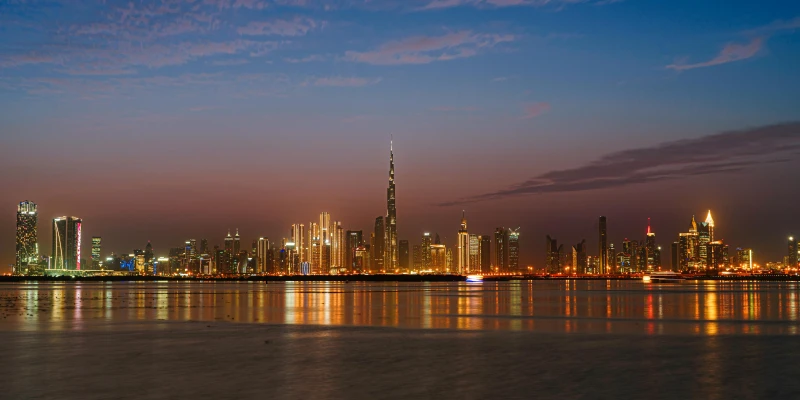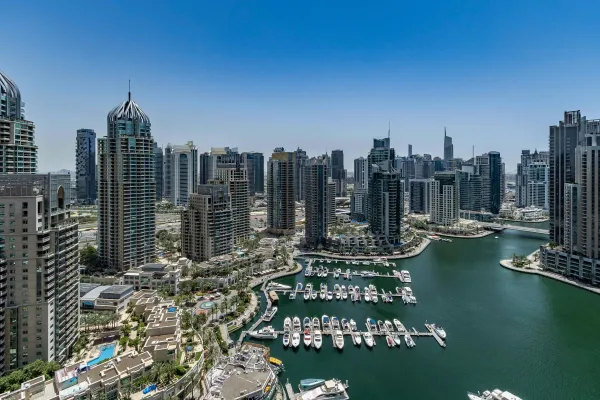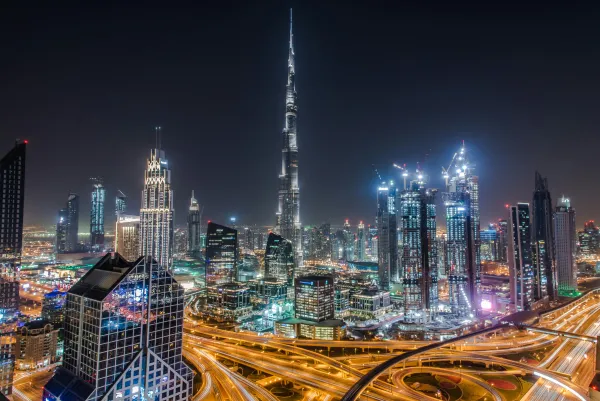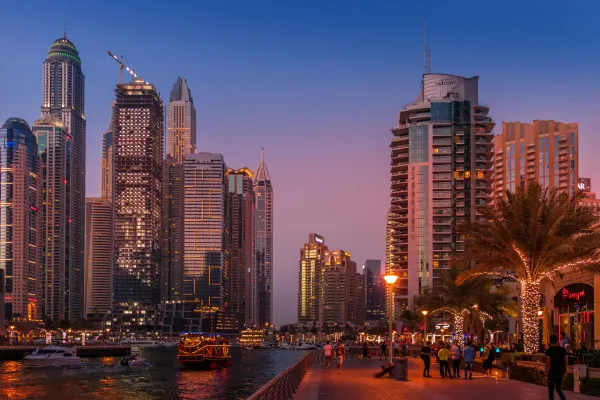
Dubai Real Estate Investment Guide 2025: Prime Neighborhoods & Market Analysis
Bottom Line: Dubai property gives great returns to foreign buyers. Rental income averages 6.7% per year. Home prices rose 20% in 2024. Jumeirah Village Circle offers the best deals - studios make 8%+ returns at low buy-in costs. Dubai Marina gives steady growth plus income for buyers who want luxury living.
Market Overview: Dubai's Growth Story
Dubai hit big numbers in 2025. Property sales topped AED 431 billion in just six months. That's 25% more than 2024. The city's population hit nearly 4 million people. More people need more homes.
This growth drives rental demand all over the city. Over 125,000 deals happened by mid-2025. That's 26% more than last year. Foreign buyers made up 55% of new investors. Indian buyers lead the pack.
Why do people invest here? Dubai lets foreign buyers own property in special zones. No tax on profits when you sell. No tax on rental income either. The Golden Visa program lets property owners stay long-term. Builders offer easy payment plans too.
Best Areas to Buy Property in Dubai
Jumeirah Village Circle: Best Value for Money
JVC gives Dubai's best rental returns. It covers 870 hectares with over 350 apartment buildings. You can choose from studios to three-bedroom units. All give good returns.
Key Numbers:
Average apartment price: AED 328,561
Studio rental returns: 8.38%
Three-bedroom returns: 7.34%
Drive to DIFC: 15 minutes via Sheikh Zayed Road
Metro: Business Bay station (10 minutes away)
What's Nearby:
Shopping: Circle Mall, Dubai Marina Mall close by
Doctors: Many clinics in the area
Schools: GEMS World Academy, Foremarke School (5km away)
Fun: Community pools, gyms, parks
Dubai Marina: Luxury by the Water
Marina homes cost more but give steady returns. The waterfront location draws young workers and expat families who want luxury living. Rental demand stays strong all year.
Investment Numbers:
Studio returns: 5.8-6.2%
One-bedroom returns: 6.1%
Two-bedroom returns: 5.9%
Price per square foot: AED 1,800-2,200
Drive to Downtown: 12 minutes by Metro
Getting Around:
Metro: DMCC and Ibn Battuta stations
Tram: Direct link to JBR and Al Sufouh
Drive to DIFC: 15 minutes
Major spots: Dubai Marina Mall, The Walk, Marina Yacht Club

Business Bay: Central Hub Advantage
Business Bay properties benefit from proximity to DIFC and Downtown Dubai, creating strong rental demand from professionals working in the financial district. The area's mixed-use development combines residential towers with corporate headquarters.
Performance and Pricing Data:
Studio yields: 6.8%
One-bedroom yields: 6.66%
Average apartment price: AED 950,000-1,400,000
Price per sq ft: AED 1,200-1,600
Occupancy rates: 90%+ year-round
Location Advantages:
Walking distance to DIFC (5 minutes)
Metro connectivity: Business Bay station
Commute to Downtown: 8 minutes
Mixed-use amenities: Bay Avenue retail, dining, Dubai Canal waterfront

New Hot Spots: Dubai South and The Valley
Dubai South sits near Al Maktoum International Airport and Expo City. It offers affordable luxury for families and long-term investors who want their property to grow in value.
Dubai South Numbers:
Villa prices: AED 1.2M - 2.5M (3-4 bedrooms)
Rental returns: 6-7%
Airport distance: 10 minutes to Al Maktoum International
Expo City: Direct connection
Who lives here: 65% families, 35% young workers
The Valley Features:
Property types: Townhouses and villas
Price range: AED 1.5M - 3.2M
Location: Al Ain Road area
Drive to Downtown: 25 minutes
Community perks: Adventure parks, sports courts, pools
Property Prices and Performance in Dubai
Prices vary a lot between areas. JVC averages AED 1,450 per square foot. This creates easy entry points for new investors. Luxury spots like Palm Jumeirah cost over AED 3,000 per square foot. These target luxury buyers. These price gaps let you invest at different budget levels.
Apartment values jumped 20% in 2024. Two-bedroom units climbed 17%. Three-bedroom homes gained 10%. Villas showed 22% growth. Top areas like Arabian Ranches and Dubai Hills Estate did especially well.
Rental Market: Strong Income Potential
Dubai's rental market shows great strength. Average returns hit 6.7% across all home types. Apartments make 7.24% returns. Villas average 5.2%. These numbers beat many global markets by a lot. This makes Dubai great for income-focused investors.
Growth patterns differ by location and home type. Established areas like Dubailand, Meydan, and International City saw 39-46% rent increases per year. But newer areas maintain moderate growth while providing modern amenities that attract good tenants.
The rental market gets strength from Dubai's growing population and diverse economy. Professional sectors like finance, tech, and healthcare create demand for quality housing. Tourism recovery supports short-term rental chances in prime spots. This adds flexibility for investors who want multiple income streams.
Buying Process and Investment Costs
Foreign buyers can buy property in special freehold areas without living in Dubai. The buying process involves opening a UAE bank account. You sign purchase papers with Dubai Land Department watching over things. You pay registration fees - usually 4% of the property price.
New rules require non-resident sellers to keep UAE bank accounts for deals to complete. This change makes processes smoother while keeping market transparency and buyer protection in place.
Professional property management services work well for foreign investors. Management companies handle finding tenants, collecting rent, and fixing things. Management fees typically cost 5-10% of yearly rental income. This varies with service levels you want.

What's Coming Next for Dubai Property
Dubai's Real Estate Strategy 2033 wants to double the sector's GDP contribution. This happens through innovation and new technology. Green building initiatives align with Dubai's Net-Zero 2050 goal. This creates preference for eco-certified properties among buyers who care about the environment.
Supply and demand stay favorable despite more building activity. While 48,000 new units are planned for 2025 and 72,000 for 2026, demand still beats supply in prime spots. This imbalance supports continued price growth and rental increases across good neighborhoods.
Infrastructure spending includes Dubai Metro expansion, better roads, and smart city projects. These boost property values all over Dubai. Major projects like Dubai Creek Harbour and Dubai Hills Estate benefit directly from these connectivity improvements. This positions them for sustained growth.
Market experts project 5-7% yearly price growth through 2025. Luxury segments might beat these forecasts. Rental yields may drop slightly as supply increases. But Dubai's competitive position versus global markets stays very strong.
Looking for the right approach to buying property abroad?
Common Questions About Dubai Property Investment
Which Dubai areas give the best rental returns for first-time buyers?
Jumeirah Village Circle leads with studio apartments making over 8% returns. This makes it ideal for buyers with smaller budgets. Arjan provides similar returns at 7.58% with lower entry costs averaging AED 266,392. Both areas offer great connections to business districts while keeping prices affordable compared to luxury locations.
How do Dubai property prices compare to other world cities, and what makes the market good?
Dubai property prices average AED 1,597 per square foot. This sits well below major global cities. London averages $19,350 per square meter versus Dubai's $3,850 for luxury properties. Combined with zero tax on profits, no rental income tax, and 5-9% yields, Dubai offers much better value for foreign investors.
What are the costs and rules for foreign property buyers in Dubai?
Foreign buyers pay 4% Dubai Land Department registration fees plus 2% real estate agent fees. Extra costs include mortgage registration (0.25%) and property valuation fees. Buyers must open UAE bank accounts and can get financing up to 75% of property value. No residency rules exist for freehold area purchases.
Which areas show the strongest growth potential for long-term investment?
Dubai South benefits from Al Maktoum International Airport closeness and Expo City development. This supports long-term value growth. Dubai Hills Estate combines luxury amenities with great connectivity. Emerging communities like The Valley offer suburban options with family-oriented features. These areas provide balanced growth potential with reasonable entry pricing.
How does Dubai's rental market perform during tough economic times?
Dubai's rental market shows strength during global uncertainties. This gets support from economic diversity beyond oil dependency. The emirate's safe-haven status attracts foreign residents during regional problems. Population growth averaging 5% yearly creates sustained rental demand. Government programs like Golden Visas provide market stability through long-term resident commitments.
What property management options exist for foreign investors?
Professional property management companies offer full services including tenant screening, rent collection, maintenance coordination, and legal compliance. Full-service management typically costs 8-10% of yearly rental income. Basic services range 5-7%. Many companies specialize in specific neighborhoods or property types. This enables targeted expertise for optimal returns.